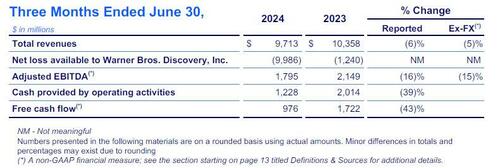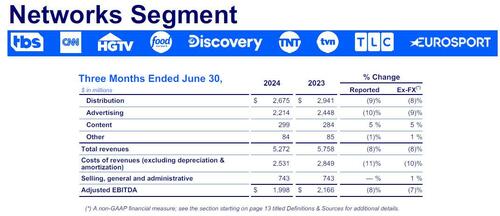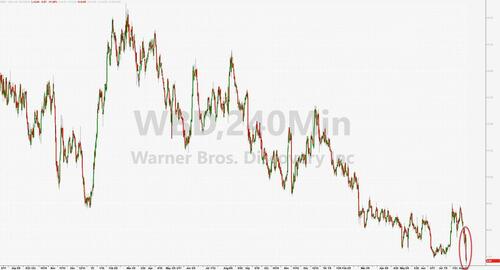
What had been obvious "to the rest of us" for years, is finally official: late last night, shares of Warner Bros. Discovery, the parent of CNN and TNT, crashed 10% to the lowest level on record after it reported dire results, which missed across the board and plunged across every income statement category...
... but the biggest hit - and surprise - was the company's stunning $9.1 billion charge taken to write down the value of its traditional TV networks, such as CNN and TNT, which were acquired in 2022 when Warner Bros Discovery was created as part of its acquisition of WarnerMedia. The write down confirmed that legacy cable channels like CNN and TNT are no longer worth what they were when the $42 billion merger was completed. In fact, judging by the ongoing mass layoffs at the former, one can argue that CNN's value is now negative and will continue to be so until it stops hemorrhaging cash.
For the quarter, Warner Bros. reported a net loss of $10 billion, which included additional charges of $2.1 billion related to its merger. Revenue for the quarter fell 6.2% to $9.71 billion. Of note, the revenue collapse in the company's Networks segment, which includes CNN, just won't stop.
“Two years ago market valuations and prevailing conditions for legacy media companies were quite different than they are today,” CEO David Zaslav said on a call with investors on Wednesday. “This impairment acknowledges this and better aligns our carrying values with our future outlook.”
As Bloomberg notes, the writedown follows last month’s decision by the NBA to drop Warner Bros. as a broadcast partner and award a $76 billion, 11-year media rights deal to Walt Disney, Comcast and Amazon.com. Warner Bros. filed a lawsuit against the NBA last month alleging a breach of contract.
“At this point, we’ve handed it off to our lawyers,” Zaslav said on the call. “We have confidence in our position.”
More importantly, the writedown reflects the continued exodus of viewers from cable networks like roaring propaganda dumpster fire CNN to streaming, taking with them the advertising sales and subscriber fees that supply most of the revenue for conventional TV. The changes have rippled across media. Disney, which announced third-quarter results earlier Wednesday, reported declines in linear television advertising sales and subscribers, sending the stock to a ten year low and once again confirming that once you go woke... well, everyone knows what happens next.
Warner Bros. has eliminated more than 2,000 positions over the past year and slashed 100 jobs at CNN last month. The company raised subscription prices for its Max streaming service in June.
Under different management teams over the past 20 years, Warner Bros. has been involved in some of the worst and most criticized merger deals. They include the $124 billion merger of Time Warner with America Online in 2001 and the later purchase of Time Warner by AT&T Inc. for $87 billion in 2018.
Warner Bros. shares plunged as much as 9.9% to $6.95, the lowest price since the stock of the merged company began trading in April 2022, and down over 70% in the past two years.
What had been obvious “to the rest of us” for years, is finally official: late last night, shares of Warner Bros. Discovery, the parent of CNN and TNT, crashed 10% to the lowest level on record after it reported dire results, which missed across the board and plunged across every income statement category…
… but the biggest hit – and surprise – was the company’s stunning $9.1 billion charge taken to write down the value of its traditional TV networks, such as CNN and TNT, which were acquired in 2022 when Warner Bros Discovery was created as part of its acquisition of WarnerMedia. The write down confirmed that legacy cable channels like CNN and TNT are no longer worth what they were when the $42 billion merger was completed. In fact, judging by the ongoing mass layoffs at the former, one can argue that CNN’s value is now negative and will continue to be so until it stops hemorrhaging cash.
For the quarter, Warner Bros. reported a net loss of $10 billion, which included additional charges of $2.1 billion related to its merger. Revenue for the quarter fell 6.2% to $9.71 billion. Of note, the revenue collapse in the company’s Networks segment, which includes CNN, just won’t stop.
“Two years ago market valuations and prevailing conditions for legacy media companies were quite different than they are today,” CEO David Zaslav said on a call with investors on Wednesday. “This impairment acknowledges this and better aligns our carrying values with our future outlook.”
As Bloomberg notes, the writedown follows last month’s decision by the NBA to drop Warner Bros. as a broadcast partner and award a $76 billion, 11-year media rights deal to Walt Disney, Comcast and Amazon.com. Warner Bros. filed a lawsuit against the NBA last month alleging a breach of contract.
“At this point, we’ve handed it off to our lawyers,” Zaslav said on the call. “We have confidence in our position.”
More importantly, the writedown reflects the continued exodus of viewers from cable networks like roaring propaganda dumpster fire CNN to streaming, taking with them the advertising sales and subscriber fees that supply most of the revenue for conventional TV. The changes have rippled across media. Disney, which announced third-quarter results earlier Wednesday, reported declines in linear television advertising sales and subscribers, sending the stock to a ten year low and once again confirming that once you go woke… well, everyone knows what happens next.
Warner Bros. has eliminated more than 2,000 positions over the past year and slashed 100 jobs at CNN last month. The company raised subscription prices for its Max streaming service in June.
Under different management teams over the past 20 years, Warner Bros. has been involved in some of the worst and most criticized merger deals. They include the $124 billion merger of Time Warner with America Online in 2001 and the later purchase of Time Warner by AT&T Inc. for $87 billion in 2018.
Warner Bros. shares plunged as much as 9.9% to $6.95, the lowest price since the stock of the merged company began trading in April 2022, and down over 70% in the past two years.
Loading…







